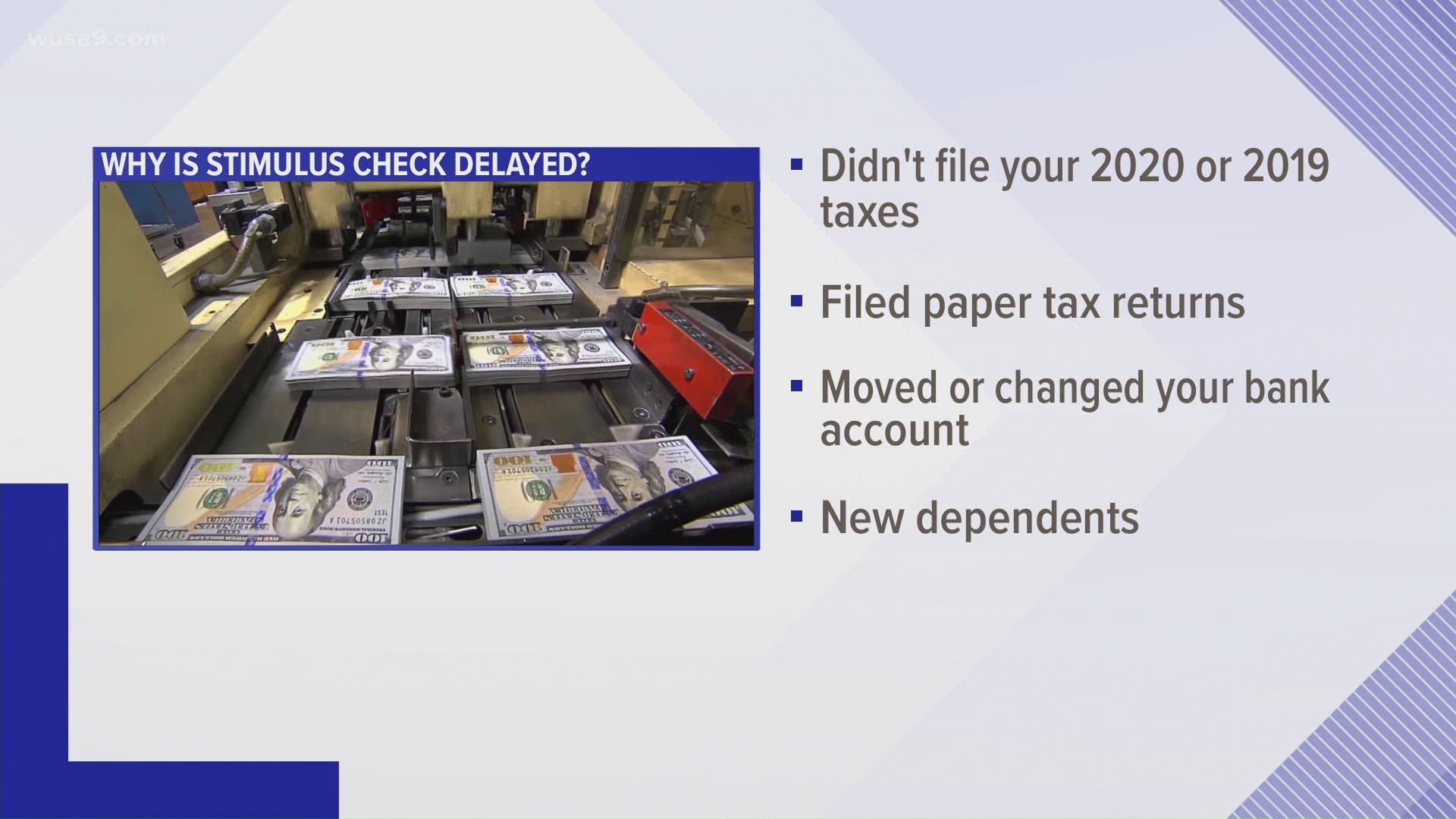WASHINGTON — The Verify team exists to give you the answers, and with tax season here and new coronavirus relief aid, there have been a lot of questions.
With a new May 17 deadline to file, preparing your taxes might look a little different this year.
To help break down some of the confusion, we put together a list of the top questions from the IRS. Here's a breakdown.
Answering some of your top 2020 Recovery Rebate Credit Questions
Do I owe taxes on my government stimulus checks?
No, the government stimulus checks aren't taxed, and you don't have to report the $1,200 or the $600 you might have received in 2020. Unemployment checks, on the other hand, are a bit different.
To report unemployment income, the agency says you'll need to use Form 1099-G, which is what state tax refunds are reported on.
I'm eligible for the 2020 Recovery Rebate Credit, but I forgot to claim it on my tax return. Do I need to amend?
You will need to file an amended tax return called Form 1040-X. The IRS said they won't calculate your 2020 Recovery Rebate Credit for you if you didn't enter any amount on your original tax return.
Somebody has claimed me as a dependent for their 2020 tax returns. I just got a notice saying my total 2020 Recovery Rebate Credit has changed. What next?
It's important to check how you filed your 2020 return. According to the IRS, if you already filed a 2020 return and checked a box saying you could potentially be claimed as a dependent by another taxpayer, then you wouldn't be eligible for the Recovery Rebate Credit to begin with.
"You do not need to take any action as the notice is informing you that the IRS already adjusted your return and disallowed the 2020 Recovery Rebate Credit," the IRS website reads. "No further action is needed."
Are the stimulus checks I received garnished? Can debt collectors take them?
It depends on the type of debt that you have and who would be attempting to collect it. Like the previous rounds of stimulus checks, this aid can NOT be garnished by the federal government or the IRS. But it could be potentially garnished from private companies.
“It’s quite possible that it could be garnished, depending on the type of debt you owe," Henry Grzes, from the American Institute of CPAs, told our Verify team. "If you’re behind on credit card payments and the credit card company has filed a judgment against you," Grzes said. "And it’s if you have other private debt. They will be able to access that.”
You can find out more about garnishing and which companies might be eligible by clicking here.
Can you deduct work from home expenses on your taxes?
If you get a W2, you’re not eligible for the home office deduction, but if you get a 1099 – you are.
Our sources for this one are Dave Finklang, a Certified Public Accountant with Anders CPAs, and Susan Allen, a Senior Tax Manager with the Association of International Certified Professional Accountants.
Finklang said that the Tax Cuts and Job Act of 2017 changed the federal filings for people who get a W2.
"Unfortunately as part of the job cuts and tax act one of the things they took away from us to lower all the tax rates was the ability to take the home office deduction," he said.
The IRS backed that up on their site, writing “generally…you can not deduct items related to your home (sic) as business expenses.”
Susan Allen with AICPA said instead, “If you work as an employee, you should ask your employer to reimburse you for work-related expenses.”
So we can Verify that for those who get a 1099 form, like the self-employed and contractors – our experts said you do qualify for that deduction.
What exactly is the child tax credit under the American Rescue Plan?
The child tax credit will now be $3,600 per year for each child under the age of six. It will be $3,000 per year for each child between six and 17.
This is a change from the typical child tax credit of past years, which is only $2,000 and excludes 17-year-old children.
The payments will only be available for families that meet the income qualifications. The payments start to phase out for individuals making $75,000 per year and joint filers making $150,000 per year. After that, the money starts to be phased out at intervals of $50 per every $1,000 of adjusted gross income.
Those making up to $200,000 individually and $400,000 as a couple would still be eligible for the $2,000 tax credit that existed before the passage of the COVID relief bill.
To check whether someone's income qualifies, the IRS will look to the most recent tax returns, said Karl.
“If you’ve already filed your 2020 return -- it would be based on that. If you have not, then it would be based on your 2019 return.”
For more on the credit and when payments should be arriving, click here.
Speaking of kids, what if I misfiled a part of their information like their Social Security Number or last name? Does that impact my filing for the 2020 Recovery Rebate Credit?
You do need to contact the IRS if you might have misfiled for a child. The agency said if you have a qualifying child and forgot to add their ATIN or SS number on the return to call the number on the top-right hand corner of your letter of notice. Be sure to have whatever cards are necessary to correct the info.
If you might have misspelled a last name, the IRS says to make sure you compare what you put on the 2020 return for your child to what's on their Social Security card.
"If the name and number entered on the return does not match what is on the card, the credit will be denied for that child, " a FAQ from the IRS reads. "If you identify an error in the tax return entry, contact the IRS at the number provided on your notice and have a copy of the Social Security card(s) available. If the information entered on the tax return matches the Social Security card or you have recently changed your child’s last name and did not update it with the Social Security Administration (SSA), please contact the SSA prior to contacting the IRS to confirm the information they have on file is accurate."


